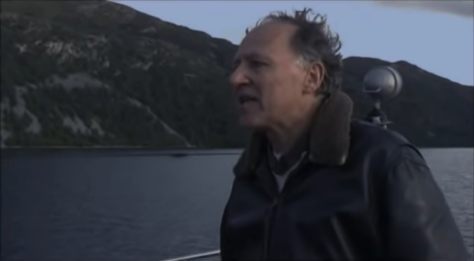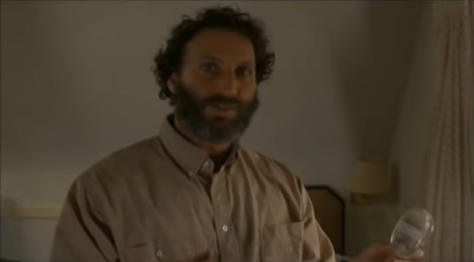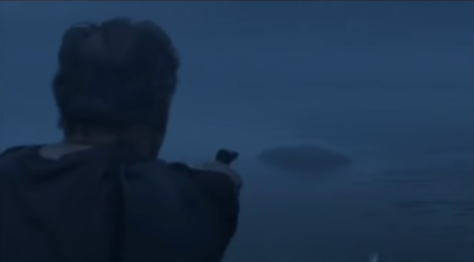
Incident at Loch Ness is a postmodern film to the extreme, a mockumentary that jumps from tone to tone and exploits preconceptions about certain filmmakers and genres—a film about the making of a film, with a separate documentary crew filming someone else making a different documentary. Despite starring legendary director Werner Herzog, it is not actually one of his movies, and honestly doesn’t even really try to replicate the feeling of his documentaries despite clearly playing off his ideas of “fact vs reality”/ecstatic truth and his reputation as a rogue filmmaker. Really, it feels much more Hollywood, which is also one of the central jokes here, but at times goes far beyond self-parody—this is the kind of movie where Jeff Goldblum and Crispin Glover can show up for cameos, and where all the featured players are film industry people playing themselves, including screenwriter Zak Penn (he of such films as X2: X-Men United and Behind Enemy Lines, and the actual director of this movie) playing the ultimate pathetic movie hack. All of that gets centred around the Loch Ness Monster, which makes total sense for a film about what is or isn’t real.
Very early in the movie, Herzog makes some statements that more or less reflects my own thoughts on cryptozoology, or unsolved mysteries in general (which I’m pretty sure I’ve mentioned before on this site, and probably on other sites): the “real thing” is often less interesting than what these things say about our “collective dreams or collective nightmares”, as he puts it. Shortly after that, we get some brief exchanges where Jeff Goldblum, quoting Carl Sagan, argues with someone about whether or not it’s okay for people to believe in things that aren’t true. For the most part, these ideas don’t actually play into the movie that we see, because for us in the audience there really isn’t any question about what’s real or not—we know this is fake, and the movie itself plays its falsity for laughs. I would think that this was at least partially inspired by The Blair Witch Project from only a few years before, but Incident didn’t even have that movie’s very short period of ambiguity. If Herzog actually made a documentary on this subject, he’d probably delve deeper into why people believe in these things—a movie like Encounters At the End of the World is all about the strange personalities he talks to, and there are plenty of strange personalities in the Loch Ness Monster industry, let me tell you—but as I said, I think this is more about using the reputation/legend of Herzog and his ideas about filmmaking as a vehicle for the plot, and its satire of phoniness in films, than it is about actually exploring broader ideas about belief and reality.

Herzog had been making movies for years, of course, but it was the early-to-mid two-thousands when the Internet started to catch on to some of his legendary antics—among others, his relationship with Klaus Kinski, the whole “eating his shoe because he lost a bet to Errol Morris” episode, and the more recent (at the time) “not a significant bullet” interview. Herzog himself seemed to be an exaggerated figure, not entirely unlike the characters in his films, and when Chuck Norris jokes started to go out of fashion, his actual legacy of unbelievable-but-true stories was ready-made to be shared online by movie buffs, and then everyone else. Incident at Loch Ness was probably at the forefront of modern Herzog appreciation, making a whole movie based on the common perception of him (“famous film maker Werner Herzog finds the Loch Ness Monster” feels like an Internet joke.) It even throws in some commentary on the factual nature of those larger-than-life tales: at one point, Zak Penn points a gun at Herzog to keep him filming, because he heard Herzog had done the same to Kinski, which Herzog has to exasperatedly explain was only a story. While it doesn’t seem like the movie is particularly well-remembered now, I still think it had an effect on how people look at Herzog and his life.

For the most part, the movie is going for farce—Zak Penn, the character, is such an obvious jerk, a guy who wants the prestige of working with Herzog but also thinks the documentary needs to be more “dramatic” and pandering, so he hires actors (including a model, so he can have at least one scene of her cavorting around in a bikini) and plans to fake a monster sighting with a dinky model, unbeknownst to most of the crew, including Herzog. The documentary crew who are filming Herzog’s documentary crew are omnipresent, but also treated as a nuisance, especially by Penn—we learn that they were not actually invited to Scotland, but showed up the airport to meet Herzog there anyway. Almost all the events that play into the climax, like the boat’s radio being disconnected, happen to accommodate the increasingly belligerent film crew, who end up quitting anyway. Finally, the “crypto-zoologist” Penn hires is a complete cartoon, a parody of the kind of person who appears in documentaries about unsolved mysteries (for example, asking for evidence that something is not real), so the eventual revelation that he is also an actor (in the movie itself, I mean) doesn’t come as much of a surprise even though the revelation is pretty last minute. The only one who is not really treated as a purely comical figure is Werner Herzog, who becomes increasingly irritated over the course of trying to make the documentary, and seems to continue out of stubbornness, or possibly spite. The joke there seems to be that even a guy who made a movie where real people had to carry a real boat over a hill finds this situation to be annoying.

That comedy goes completely out of the window when the real deal monster attacks their boat, and its a whiplash-inducing tonal shift. They play up almost every single horror trope they can muster—the fog rolling in, the aforementioned loss of radio contact, the offing of the least important characters, the sonar being used to show when the monster appears again, and the interpersonal conflict as things become increasingly dire. Everyone treats this situation deathly seriously, and the only bit of joviality is (technically) when Zak Penn steals the lifeboat, living up to his conniving character—it’s essentially another movie inserted in, which lasts for just over ten minutes. That fits into the postmodern nature of Incident, but it’s played so straight, likely as a structural prank, that there probably isn’t much actual commentary to mine from it—this is just a monster attack scene, no more, no less. Herzog’s own commentary on the event afterwards is probably the most thematically interesting part: despite many years of risking his life and the lives of others to make his movies, this seems to shake his entire ethos. He says that finding the monster ended up being “strangely unfulfilling” (because he wasn’t looking for it), and that it felt “vulgar and pointless”, which could be taken as a commentary on the genre shift into B-movie territory. He’d rather manufacture a deeper drama than have to actually experience it—reality is frightening, with no real enlightenment to be found.

Then the ending introduces yet another layer to it, as it is filmed on a home video camera owned by a vacationing Scottish couple (the presence of actual Scottish people in the film, or the non-presence, is briefly brought up a few times—Penn’s local assistant seems to take some umbrage with another Nessie film and would rather be covering real issues, and locals attack the fake cryptozoologist in a bar when they think he’s running another hoax), first by them and then by Zak Penn, who they find in the water (and who continues to be self-important and flippant despite what transpired.) Later, a representative of the local government declares that no one knows what really happened (he actually says something like “there’s one word on everyone’s lips: the Loch Ness Monster”, which has to be another joke), despite the copious footage (including actual footage of the monster’s body accidentally captured by Herzog as he attempted to scuba his way to the shore), and the film continues to raise doubts about everything. Despite the seriousness of the final moments, too, Incident‘s ending credits play over very wacky music and even includes what appear to be cut scenes, basically bloopers. Every aspect of the movie is drenched in questions about truth and reality in movies—in documentaries, in the filming style of directors like Herzog, in the way Hollywood approaches movie making—but it still feels like it’s using these things to make an elaborate joke more than anything else.

